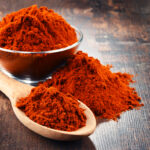Improve your metabolism naturally with cayenne pepper plus many other simple lifestyle changes
 (NaturalHealth365) Many people would love to take control of their body shape and overall well-being. Unfortunately, conventional ‘wisdom’ fails to address the underlying cause of obesity and many other health issues – a ‘sluggish’ metabolism. Today, we’ll focus on how to change that naturally with the use of cayenne pepper, specifically its active ingredient capsaicin, along with many other simple lifestyle changes.
(NaturalHealth365) Many people would love to take control of their body shape and overall well-being. Unfortunately, conventional ‘wisdom’ fails to address the underlying cause of obesity and many other health issues – a ‘sluggish’ metabolism. Today, we’ll focus on how to change that naturally with the use of cayenne pepper, specifically its active ingredient capsaicin, along with many other simple lifestyle changes.
Let’s not forget: your metabolism is the sum total of many chemical and physical processes that maintain life, and these processes are often linked to the foods we eat and other choices we make. The rate of energy generation and usage determines metabolic rate, with influences coming from our muscle ratio, gender, age, and overall health status.
How does cayenne pepper boost metabolism naturally?
Some foods alter standard metabolic rates, and this is what scientists refer to as dietary-induced thermogenesis, or simply put, the thermic effect of food. Foods like sugar do not need a lot of energy to process, while others require much. (If you want to improve your metabolism – minimize your consumption of simple, processed sugars.)
On the other hand, cayenne pepper is often listed as one of the top herbs and spices to enhance your metabolism. And, just for clarity’s sake, we (at NaturalHealth365) always suggest you buy organic – whenever possible.
Why is cayenne pepper so effective? Capsaicin – a potent substance in cayenne pepper – has a positive effect on your metabolism. Eating cayenne pepper also helps reduce food intake and makes you feel fuller for a longer time after eating a meal.
For best results, it’s essential to take at least one gram of capsaicin daily. This might make your meals somewhat spicy, but it’s a small price to pay, considering the benefits of this magical ingredient. If you can’t handle the spice, look for capsules, powder, or tincture formulas.
More (natural) ways to improve your metabolism
According to many holistic healthcare providers, you can never go wrong with eating more organic produce to help yourself avoid all those chemicals used in conventional farming practices. It’s these chemicals that (over time) increase the risk of inflammation, cellular dysfunction and a reduced ability to effectively break down foods that we eat.
And, as we said before, a compromised metabolic rate means that you’ll be at a greater risk of obesity and other chronic disease conditions like diabetes and cardiovascular problems.
A National Institutes of Health study on the effects of organochloride pesticides showed how these dangerous chemicals get stored in fat cells and eventually find their way into the bloodstream following fat burning. This is terrible news because eating a toxic diet can easily mess up our fat metabolism and mitochondria health (the energy-producing cells in our bodies).
When you eat more organic foods – all those negative effects will fade away, and your efforts will be rewarded in many ways, including a loss of excess body weight.
Why it’s wise to consume high-quality nutritional supplements
In addition to boosting your metabolism with herbs and spices, nutritional supplements can help you achieve a better body, mind, and soul. But you need to be cautious; some companies sell low-potency (and toxic) heavy metal products that won’t help improve your health.
On the other hand, high-quality green tea and vitamin B supplements are known to improve metabolism. B vitamins power the energy-converting reactions and other metabolic functions essential to good health. In fact, B vitamin deficiencies are directly linked to a sluggish metabolism.
In addition to its antioxidant properties, green tea can improve your metabolism. Tea contains catechins and naturally occurring caffeine, which increases fat breakdown and boosts metabolism.
Finally, some other good tips: get plenty of rest (avoid getting ‘stressed out’); build muscle by doing some strength training (2-3 times per week); and, of course, drink plenty of clean (pure) water daily.
Take action today and stay consistent for long-lasting positive results.
Sources for this article include:



